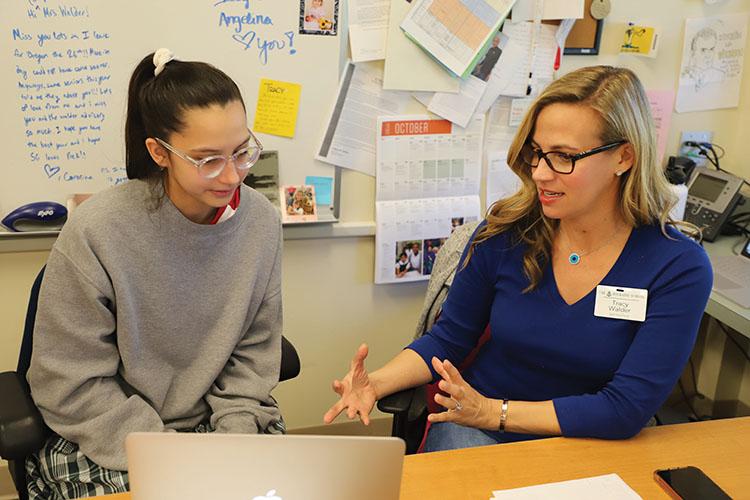//PICTURED ABOVE: Tracy Walder, Upper School Spycraft Teacher, advises Isabel Chavez on details about her podcast about national security and foreign policy.
Every morning, some Hockaday girls jump into the car and instinctively turn on their favorite podcast. Little do they know that, on their drive to school, they can listen to a podcast made by their Hockaday classmates. Students in Spycraft: Espionage and Diplomatic Policy are producing a national security podcast for teens across the country.
Upper School history teacher Tracy Walder, who teaches Spycraft, came up with the idea over the summer after she constantly listened to history podcasts in her car while her daughter was at swim lessons. Through a Hockaday grant, Walder visited the International Spy Museum and learned they produced a national security podcast. However, she noticed that the broadcast was geared toward an older audience.
“There really wasn’t anything that appealed to a younger set,” Walder said.
When Walder teaches national security events in her class, she makes PowerPoints like “Understanding ISIS” that break down the information on complicated issues in eight slides or less. With the class’s Spygirls podcast, Walder said she wanted to transfer this style of learning into an interactive medium that could be shared around the globe.
“I thought, ‘Why couldn’t I parlay this into a podcast medium so that it could reach more people?” Walder said.
Walder’s class podcast will reach more people than she even anticipated. During her summer at the International Spy Museum, she developed a close working relationship with museum Education Directors, Lucy Stirn and Jaqueline Eyl, and also met Historian and Curator Vince Houghton, who runs the Spy Museum’s podcast SpyCast, which has roughly 20 million listeners.
On a whim, Walder emailed and asked them to listen to Spygals and consider promoting it on the Spy Museum’s podcast. When they replied, the Spy Museum announced they would like to run Spycraft’s teen-centered podcast in conjunction with their podcast geared toward older audiences.
Senior Riyana Daulat said she loves the idea of Spygals, having a national base.
“I think it is so cool that our podcast can have an impact not only in our school community but also in the broader community of the United States,” Daulat said.
To begin the project, Walder assigned her students to listen to different podcasts to open a dialogue about what makes a good production. She then grouped the girls by their requests for topics related to national security or foreign policy and gave the teams time to research in class.
The groups presented rough draft scripts to her, which she highly edited and returned to the students to improve before they recorded them.
One requirement for the Spycraft podcasts was that each made claims and provided evidence; Walder did not want her student to just narrate the events surrounding their topic. She said when audiences are able to agree or disagree with each episode, the podcast becomes more interesting and engaging.
“I wanted it to have a question to it, like ‘What are you proving?’” Walder said. The topics students picked included bioterrorism in the United States, Venezuela’s travel advisory against America for the United States’ lack
of gun control and the lack of preparedness for wars involving outer space. Senior Abby O’Brien and her partner chose to explore how the United States enabled the creation of international terrorist groups, specifically Al-Qaeda and ISIS. O’Brien wanted to research this topic after she heard about it briefly during her AP United States History class with Walder last year.
“I feel like it’s a very interesting issue considering how the United States likes to distance itself from international terrorism and to paint things at the extremes, but we were directly involved in creating it,” O’Brien said. “We have been on the same side as [Al-Qaeda] in a couple of conflicts.”
Daulat’s team wanted to explore the loss of masculinity in male supremacy groups. They focused on whether emasculation has caused an increase in violent attacks by male supremacists.
“After reading an article in The New York Times a couple of months ago titled ‘The Boys Are not All Right’ written by Michael Ian Black, we were driven to further explore the topic of male supremacy,” Daulat said.
The students began recording the week of Oct. 14 and are using an app called Anchor to record, edit and publish the broadcasts. Upper School Technology Integration Specialist Candace Townsley worked with Walder on the project and tried a few different podcasting apps before finalizing her decision. Townsley’s role is to help students produce successful podcasts and help them use Anchor to record and edit them.
Even though podcasting pervades popular culture, Spygals is Hockaday’s first published podcast and one of the few scholastic podcasts across the country.
“I know podcasting, even though it has been around a long time, a lot of schools don’t do it because of privacy issues,” Townsley said.
To add another element of production to the podcasts, O’Brien created a jingle for Spygals. She began researching popular spy theme songs, focusing on the soundtrack from “The Man from U.N.C.L.E” and layered different instruments like bongos and bass to create a high energy theme song.
“I want the listener to be engaged immediately,” O’Brien said.
O’Brien and Daulat said they cannot wait for the podcasts to be released.
“Having this be the first class at Hockaday to create podcasts, I really like knowing that we are paving the way for future students,” Daulat said.
Story by Kate Woodhouse
Photos by Eugene Seong







